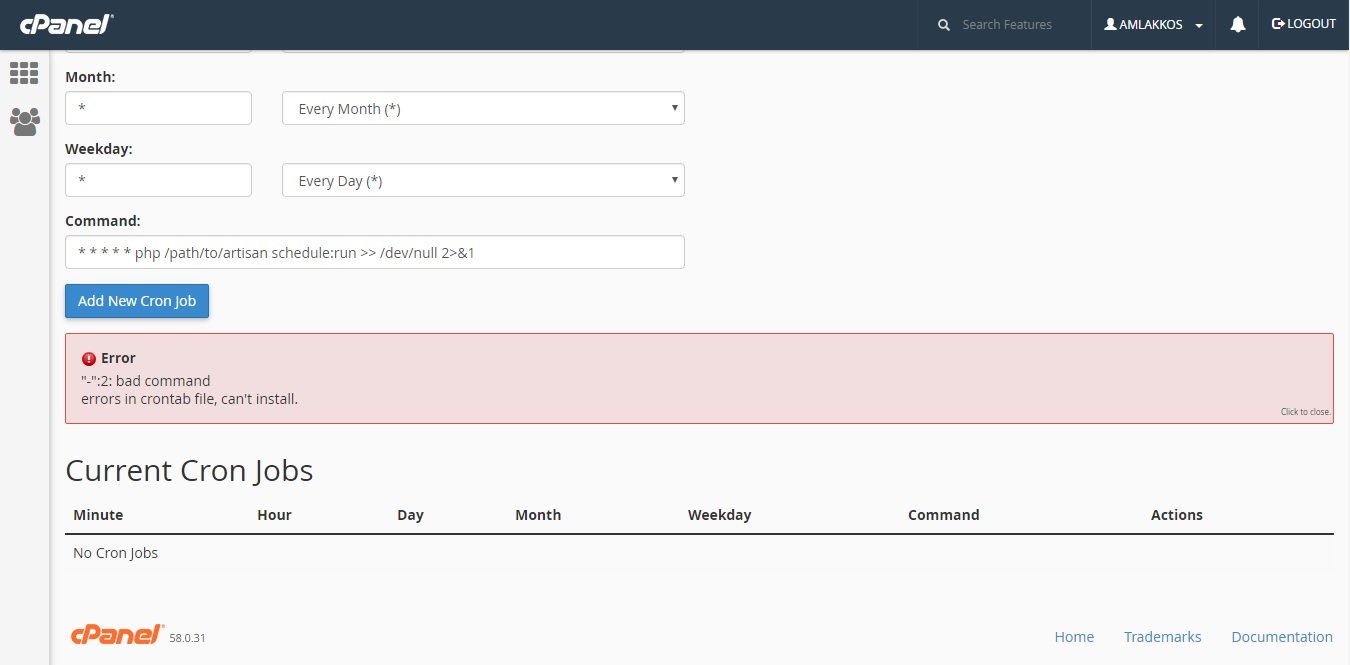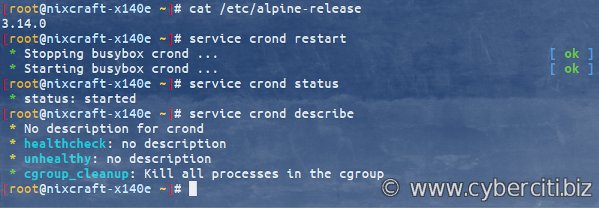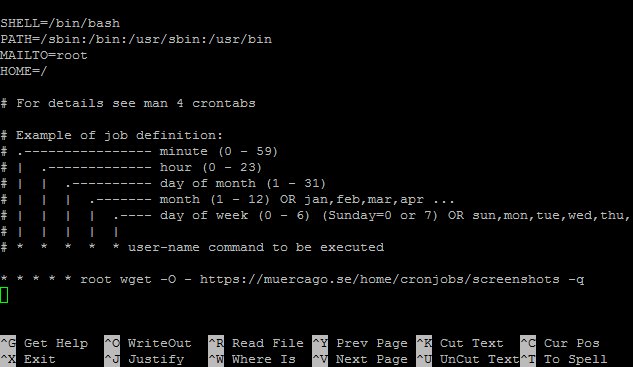Looking to run cron jobs every 5 seconds? You’ve come to the right place! In this article, we’ll dive into the solution for scheduling cron jobs at such a rapid interval. Whether you need to perform frequent tasks, collect real-time data, or automate critical processes, keeping your cron jobs running smoothly every 5 seconds can be a game-changer. So, let’s explore how to achieve this and ensure your systems stay on track. Ready? Let’s get started!
cron every 5 seconds
When it comes to scheduling repetitive tasks on a Unix-like operating system, the cron utility is often the go-to solution. Cron allows you to automate various tasks by defining a schedule for them to run. While the default granularity of the cron daemon is in minutes, there may be cases where you need tasks to run at a more frequent interval, such as every 5 seconds. In this article, we will explore the possibilities of running cron jobs every 5 seconds, the challenges you might encounter, and alternative approaches to achieve similar results.
Understanding Cron and Its Limitations
Cron, short for “chronograph,” is a time-based job scheduling utility in Unix-like operating systems. It runs in the background as a daemon and executes tasks at pre-determined intervals. The syntax for defining cron jobs follows a pattern consisting of time-related fields, allowing for fine-grained control over when the tasks should run.
By default, cron’s smallest time unit is the minute, meaning you can schedule tasks to run every minute or at specific minutes past the hour. However, there is no built-in support for scheduling jobs with a granularity smaller than a minute. This limitation poses a challenge when you need to execute tasks more frequently, such as every 5 seconds.
The Challenge of Running Cron Jobs Every 5 Seconds
Running cron jobs every 5 seconds requires a workaround because the cron utility does not directly support such fine-grained scheduling. There are a few approaches to tackle this challenge:
1. Sleep-based Approach
One way to achieve a 5-second interval is to create a script that runs in an infinite loop, executing the desired task and then sleeping for 5 seconds. This approach allows you to simulate running the task every 5 seconds, although it’s not a direct use of cron.
Here’s an example shell script that demonstrates this approach:
#!/bin/bash
while true; do
# Execute your task here
sleep 5
done
You can save this script to a file, make it executable, and then run it in the background to simulate running the task every 5 seconds:
$ chmod +x mytask.sh
$ ./mytask.sh &
While this approach may work for some scenarios, it has its limitations. It doesn’t leverage cron’s scheduling capabilities and requires a separate script to handle the interval. Additionally, it consumes system resources by running a continuous loop, which may not be ideal for long-running tasks.
2. Alternative Schedulers
If you require the precision of running tasks every 5 seconds without the resource overhead of a continuous loop, you can explore alternative scheduling tools. Some options include:
- systemd Timers: If you are running a system with systemd, you can leverage systemd timers to achieve sub-minute scheduling. Systemd timers provide a more granular scheduling mechanism compared to cron, allowing you to run scripts every 5 seconds. You can define timers using systemd unit files and schedule them accordingly.
- cron-like Libraries: Another approach is to use cron-like libraries available in various programming languages, such as Quartz for Java or Schedule for Python. These libraries provide a higher level of control over task scheduling and offer support for sub-minute intervals.
Using alternative schedulers allows you to overcome the limitations of cron and run tasks at 5-second intervals with more flexibility and efficiency.
Considerations and Alternatives
While running cron jobs every 5 seconds may be necessary in some cases, it’s worth considering a few factors before proceeding:
1. System Load:
Running tasks at such a high frequency can put a significant load on your system, especially if the tasks are resource-intensive. Make sure to monitor system performance and consider the impact on other processes and users.
2. Job Duration:
Tasks scheduled to run every 5 seconds should complete within that time frame to avoid overlapping executions. If your task takes longer to execute or if it requires synchronization with other processes, consider adjusting the interval to accommodate the task’s runtime.
3. Alternative Architectures:
In some cases, the need for running tasks every 5 seconds might indicate a design flaw that could be addressed through alternative architectural choices. Consider exploring event-driven or real-time processing architectures that are better suited for rapid task execution.
4. Cron Job Chaining:
In situations where precise timing is not critical, you can schedule multiple cron jobs at different intervals to achieve an approximation of running every 5 seconds. For instance, you can schedule jobs at 0, 5, 10, 15, and so on, seconds past the minute. While this approach doesn’t guarantee exact 5-second intervals, it can be a pragmatic solution that leverages the built-in cron scheduling.
While the cron utility itself does not offer direct support for scheduling tasks every 5 seconds, there are workarounds and alternative approaches available. By leveraging sleep-based scripts or exploring alternative schedulers and architectural choices, you can achieve the desired level of precision and automation for your tasks.
However, it’s important to consider the system load, task duration, and potential design improvements before opting for such a high-frequency schedule. With careful planning and consideration, you can find a suitable solution that balances efficiency, system resources, and task requirements.
How to set crontab to execute every 5 minutes
Frequently Asked Questions
How can I schedule a cron job to run every 5 seconds?
To schedule a cron job to run every 5 seconds, you can use a combination of cron and a shell script. Here’s how you can do it:
- Create a shell script that contains the command or script you want to run every 5 seconds.
- Edit your crontab file by running the command
crontab -e. - Add the following entry to your crontab file:
#!/bin/bash
command_or_script_to_run
* * * * * /path/to/your/shell/script.sh
* * * * * sleep 5; /path/to/your/shell/script.sh
* * * * * sleep 10; /path/to/your/shell/script.sh
* * * * * sleep 15; /path/to/your/shell/script.sh
* * * * * sleep 20; /path/to/your/shell/script.sh
* * * * * sleep 25; /path/to/your/shell/script.sh
* * * * * sleep 30; /path/to/your/shell/script.sh
* * * * * sleep 35; /path/to/your/shell/script.sh
* * * * * sleep 40; /path/to/your/shell/script.sh
* * * * * sleep 45; /path/to/your/shell/script.sh
* * * * * sleep 50; /path/to/your/shell/script.sh
* * * * * sleep 55; /path/to/your/shell/script.sh
Save the file and exit. This configuration will run your shell script every 5 seconds.
Can I schedule a cron job to run every 5 seconds directly in the crontab file?
No, the crontab file only allows for specifying minute, hour, day, month, and day of the week. It does not provide a direct way to schedule a job to run every 5 seconds. However, you can achieve a similar effect by running a shell script in the crontab file that contains a loop with a sleep time of 5 seconds.
Is it recommended to schedule cron jobs to run every 5 seconds?
Running cron jobs every 5 seconds can potentially put a heavy load on your system, especially if the tasks are resource-intensive. It is generally not recommended to schedule cron jobs at such a high frequency unless absolutely necessary. Consider optimizing your task or finding an alternative solution that is less resource-intensive.
Are there any alternatives to scheduling a cron job every 5 seconds?
If you need to perform a task at a very high frequency, you might consider using other technologies like event-driven programming or message queues. These approaches allow for more fine-grained control over task scheduling and can be better suited for high-frequency tasks compared to cron jobs.
Can I use a cron job to run a task every 5 seconds in a specific time range?
Yes, you can use cron to run a task every 5 seconds within a specific time range. To achieve this, you can modify your shell script to check the current time before executing the task. If the current time is within the desired time range, the task will be executed; otherwise, it will be skipped. This way, you can limit the execution of the task to specific hours or minutes of the day.
Final Thoughts
Conclusion:
The concept of running a cron job every 5 seconds offers a unique and practical solution for managing recurring tasks at frequent intervals. With this approach, time-sensitive operations such as real-time monitoring, data synchronization, and immediate notifications can be effectively implemented. By utilizing the cron scheduler, developers can automate the execution of their scripts, simplifying complex workflows and ensuring timely execution. The ability to leverage cron every 5 seconds opens up new possibilities for creating efficient and dynamic systems, empowering developers with precise control over task execution.




